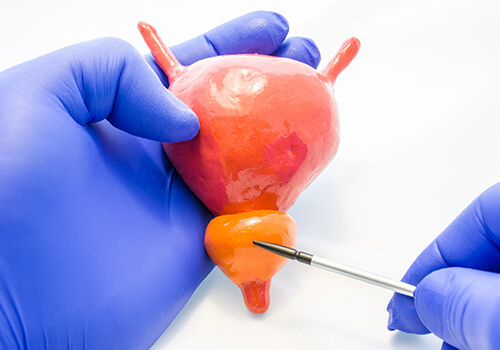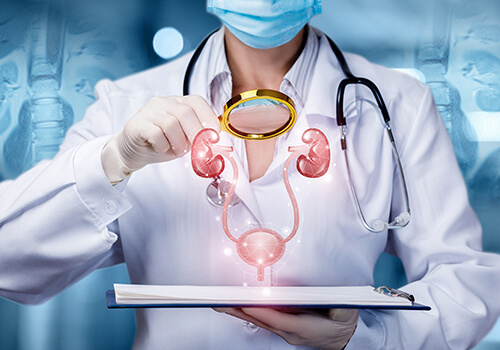


(BPH) or the full form in the medical field Benign Prostatic Hyperplasia is a non-cancerous condition that affects the prostate gland in men.
The prostate is a small, walnut-shaped gland that surrounds the urethra and plays a key role in the production of semen. As you age, the prostate gland can begin to enlarge, which can cause symptoms such as difficulty urinating, a weak urine stream, and the need to urinate frequently, especially at night.
It’s one of the most common conditions, affecting a significant percentage of men over the age of 50. It’s quite important to note that BPH is not the same as prostate cancer and does not increase a man's risk of developing prostate cancer.
The condition can lead to frustrating and embarrassing symptoms such as frequent urination, weak urine flow, and difficulty starting urination. For many men, these symptoms can impact their daily lives, making simple tasks like traveling or participating in physical activities difficult. In severe cases, an enlarged prostate can even lead to urinary tract infections, bladder damage, and kidney problems. But despite its prevalence and impact, many men are still unaware of the options available for managing and treating BPH.
However, if not treated properly or on time, it can cause discomfort and disrupt your quality of life.
Consult with a doctor if you have been experiencing any symptoms whatsoever.
With that being said, let’s take a look at some of the symptoms that you need to watch out for.

The prostate gland is located below the bladder and surrounds the urethra, the tube that carries urine out of the body. As the prostate gland enlarges, it can cause pressure on the urethra and cause various symptoms, including:
These symptoms can vary in severity and may be related to other conditions such as urinary tract infections, bladder stones, or even prostate cancer.
The exact cause of BPH is not entirely understood, but there are several factors that are thought to contribute to its development. These include:
The incidence of BPH increases with age, with most men over the age of 60 experiencing some degree of prostate enlargement. As men age, the prostate gland may simply enlarge due to changes in hormonal balance and other age-related factors.
The prostate gland is sensitive to the levels of testosterone and other male hormones in the body. As men age, their levels of these hormones may change, leading to an increase in prostate growth.
Studies have shown that men with a family history of BPH are more likely to develop the condition themselves.
Some research suggests that a diet high in fat and animal protein may increase the risk of BPH.
Certain medical conditions such as obesity and metabolic syndrome, lifestyle factors like smoking, and certain medications may also contribute to the development of BPH.
It is important to note that while these factors may contribute to the development of BPH, they do not necessarily cause it. The cause of BPH is still not fully understood, and further research is needed to fully understand the underlying causes of this condition.

To answer your question of whether BPH can be cured, the answer is no.
It is a chronic condition which means it requires ongoing medical treatments. But, not to worry. Although it’s true that It can’t be treated, that doesn’t mean it can’t be managed. With the right treatment & procedures, you can be effectively managed with various treatment options such as medication, lifestyle changes, or even surgery in more severe cases.
The goal of treatment is simple. That is to alleviate symptoms and prevent complications. Medications such as alpha-blockers and 5-alpha-reductase inhibitors can help to relax the muscles in the prostate and reduce its size, while lifestyle changes like weight loss, exercise, and a diet low in fat and animal protein can also help to reduce symptoms. Surgery, such as transurethral resection of the prostate (TURP) can be used in more severe cases to remove the excess tissue and relieve symptoms.
There is one more treatment available - Prostate Artery Embolization
Prostate artery embolization (PAE) is a minimally-invasive, catheter-based, image-guided procedure used to treat symptomatic benign prostatic hyperplasia (an enlarged prostate).
Under this treatment, the blood supply to an enlarged prostate gland is blocked. This is done by injecting small particles into the arteries that supply blood to the prostate. This causes the gland to shrink. PAE is performed by interventional radiologists, who are doctors with specialized training in minimally-invasive, image-guided procedures.
It’s highly unlikely that BPH will go away on its own. While you may experience a decrease in symptoms or a stabilization of the condition without treatment, the prostate gland will not shrink back to its normal size.
In some cases, the symptoms may be mild and not require treatment. However, as the prostate gland continues to grow, it can lead to complications such as urinary tract infections, bladder stones, and even kidney damage.
With Benign Prostatic Hyperplasia (BPH), one of the concerns that you may have is whether the condition can damage the kidneys. It is possible for BPH to cause damage to the kidneys if it is left untreated and the urinary tract becomes blocked. When the prostate gland enlarges, it can place pressure on the urethra and cause difficulty in passing urine. This can lead to urine retention and backflow of urine into the kidneys, which can cause damage over time. Additionally, if the urine is left stagnant in the bladder it may lead to urinary tract infections which can further damage the kidneys.

Men over the age of 50 are at the greatest risk for developing Benign Prostatic Hyperplasia (BPH), also known as an enlarged prostate. As men age, the incidence of BPH increases, with the majority of men over the age of 60 experiencing some degree of prostate enlargement. BPH is also more common in men who have a family history of the condition. Other factors that may increase the risk of BPH include obesity, metabolic syndrome, and certain medications. However, it's worth noting that not all men who have risk factors for BPH will develop the condition.
Message from Dr. Reddy:
As an expert, I often get asked about BPH, or Benign Prostatic Hyperplasia, which is a common condition in aging men where the prostate gland becomes enlarged. While many men experience some symptoms of BPH as they age, not all of them require treatment.
So, when is BPH treatment necessary? It depends on the severity of symptoms and the impact they have on your daily life. If you're experiencing mild symptoms like occasional difficulty urinating or weak urine flow, you may not need treatment right away. However, if your symptoms are interfering with your daily activities or causing discomfort or pain, it may be time to consider treatment options.
In some cases, untreated BPH can lead to serious complications, such as urinary tract infections, bladder damage, or even kidney damage. If you're experiencing symptoms like frequent or urgent urination, difficulty starting or stopping urination, or weak urine flow, it's important to seek medical attention as soon as possible.
There are several treatment options available for BPH, including medications, minimally invasive procedures, or even surgery in severe cases. The best course of action will depend on the individual and the severity of their symptoms.
In conclusion, if you're experiencing symptoms of BPH, it's important to talk to your doctor about your options. With proper treatment, you can manage your symptoms and continue to live a healthy and active life.
Learn How Dr. Reddy Can Help You With Your Enlarged Prostate? Request an Appointment Now!
Request an Appointment
Prostate Artery Embolization (PAE) is a minimally invasive procedure that is used to treat Benign Prostatic Hyperplasia (BPH) by reducing the size of the prostate.
The ideal candidate for PAE is typically a man who has moderate to severe symptoms of BPH that are not well-controlled with medication or lifestyle changes. Some of the criteria for PAE includes:
It is important to note that PAE is not recommended for men with severe bladder outlet obstruction or significant urinary retention, as well as those with acute urinary tract infection.
If you are experiencing symptoms of Benign Prostatic Hyperplasia (BPH) such as urinary frequency, urgency, difficulty starting urination, interrupted urine flow, weak urine stream and dribbling after urination, it is important to consult a doctor. Early diagnosis and treatment can help to manage the condition and prevent complications.
Don't let BPH control your life. Take the first step towards relief by scheduling an appointment with Interventional Radiologist Dr. Arjun Reddy today. He will work with you to determine the best course of treatment based on the severity of your symptoms and any underlying medical conditions. From medication to minimally invasive procedures, we have a range of options to alleviate your symptoms and improve your quality of life. Don't wait, make an appointment today and start feeling better.